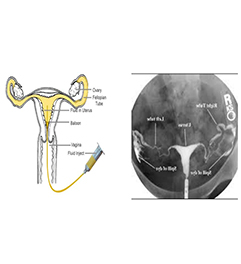What is HSG ?
A HSG (hysterosalpingogram) is often one of the first tests conducted for a female who is experiencing problem in becoming pregnant. The HSG test is an X-ray that looks in the uterus and fallopian tubes and the areas around them.
Who needs to get a HSG ?
A HSG test is regularly offered to any woman going through or seeking fertility treatment. A HSG test can determine a lot of fertility issues including overall uterine health.
Where is this procedure performed ?
The HSG procedure in our hospital is usually performed in the radiology department. In some patients it may be done under anesthesia in Operation Theater (OT), if patient or doctor prefers to do so. This will be discussed with you by your doctor.
When can this test be done in reltion to my relation?
The HSG is typically performed at least a week after your period, but before time of ovulation.
Any medications or fasting required for the test ?
Your doctor may prescribe an antibiotic or muscle relaxant prior to the procedure. Fasting for 4-6 hours is required only if procedure is planned under anesthesia in OT.
What exactly is done ?
You will have to lie down for examination similar to a routine pelvic exam with the speculum placed in your vagina. Doctor will use a “block” or medication that will numb your cervix and help you to relax so that the catheter can easily be inserted through the cervix into your uterus. The doctor will slowly inject dye into the catheter so that it fills the uterine cavity. X-rays are taken as the dye streams into the fallopian tubes and flows into the abdominal cavity.
When i will know the results of this test ?
Once your test is performed and you are comfortable you can visit your doctor same day or by taking appointment another day
What can an HSG identify ?
Your doctor will explain the results of your HSG test. Normal results will show no blockages in your fallopian tubes and a uterus that is of natural size and shape. Abnormal results could be
- Damages or blockages in the fallopian tubes
- Uterine fibroids and/or polyps
- Adhesions / scar tissue in uterus
- Abnormal shape of the uterus
Complictions of an HSG ?
As with any medical or fertility procedure, there can be some complications that arise from the HSG test. These complications are fairly rare but are still risks however.
- spotting
- fainting or nausea
- uterine infection
- allergy from the iodine dye
After HSG tests, are there any more tests required ?
Further tests may be needed to help diagnose your fertility problems and this would be decided by your doctor.
Reference
Theodore A. Baramki, Hysterosalphingography.Fertil Steril. 2005; vol 83:6: 1595-1606

